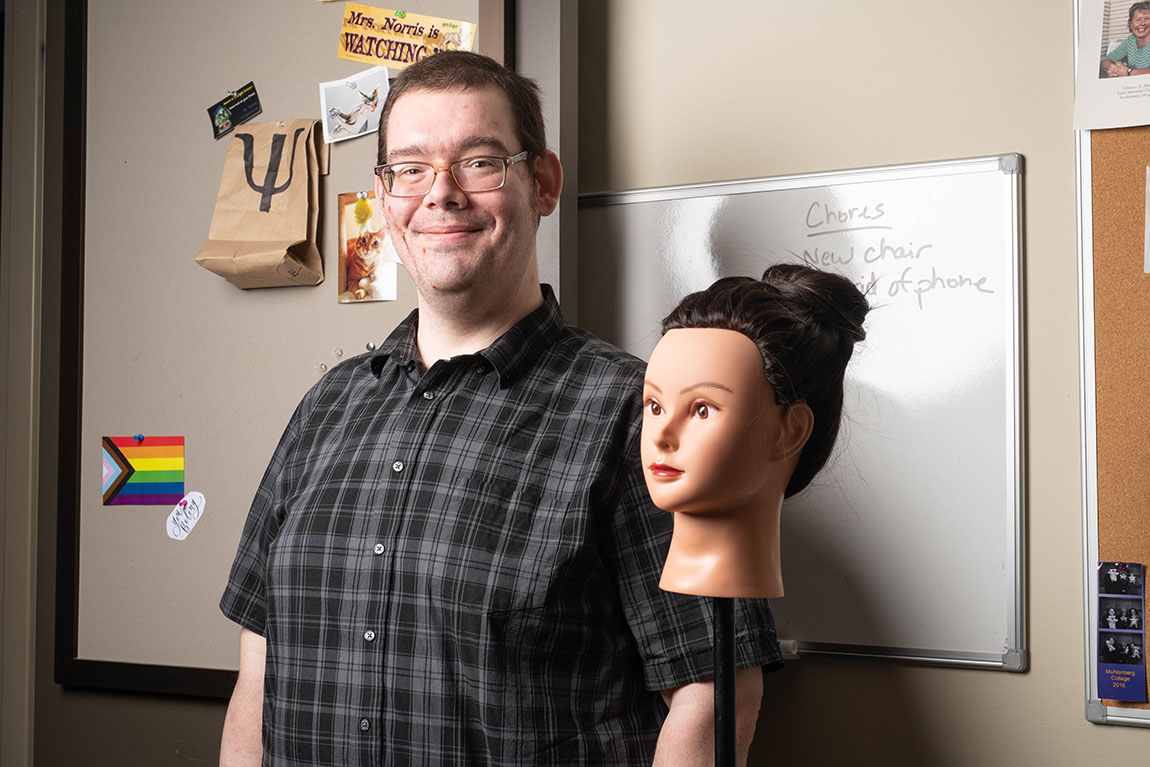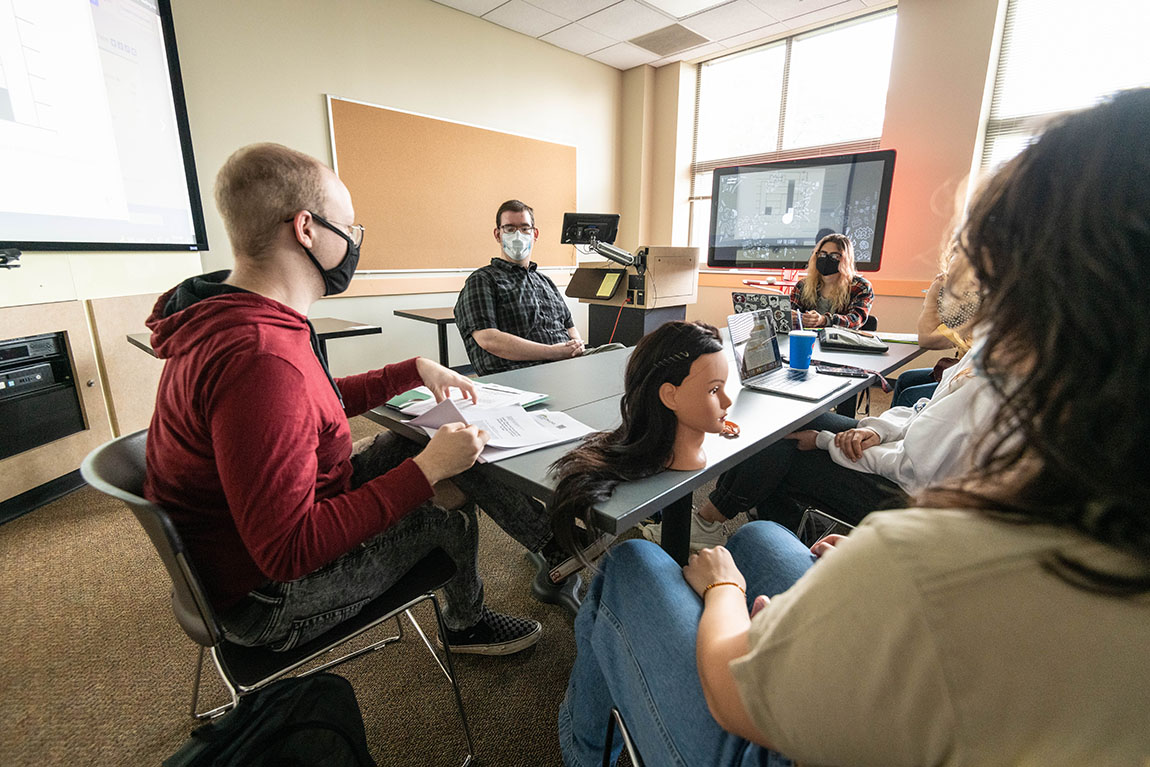Guys and Dolls
In his research into “precarious manhood,” Assistant Professor of Psychology Kenneth Michniewicz explores what it means to be seen as masculine and how fragile that perception can be.By: Meghan Kita Friday, November 5, 2021 09:02 AM
 Assistant Professor of Psychology Kenneth Michniewicz poses with the mannequin head he uses in his research. Photos by Ryan Hulvat
Assistant Professor of Psychology Kenneth Michniewicz poses with the mannequin head he uses in his research. Photos by Ryan HulvatAssistant Professor of Psychology Kenneth Michniewicz owns a mannequin head. It has big brown eyes, a full face of makeup and long, black, synthetic hair. He bought it from Amazon, which markets it as a teaching tool for cosmetology students. Michniewicz uses it in his social psychology research.
“Having men braid hair is seen as feminine,” he says. “A really easy way to induce a manhood threat is to have a man braid hair.”
Some of Michniewicz’s research deals with the concept of “precarious manhood,” the idea that a man’s masculinity hinges on the behaviors he engages in and avoids. If even the act of braiding a mannequin’s hair in front of a single researcher is enough to threaten one’s manhood, that has implications that extend to more consequential behaviors. For example, “not doing what anybody else says” is perceived as masculine. So, men have been less likely to wear masks during the pandemic, especially in socially conservative areas where traditional masculinity is highly valued.
“What speaks to me personally about manhood is this idea that we all go around like we’re cogs in the machine and manhood operates a certain way,” Michniewicz says. “It’s important to test those assumptions.”
One way he does that with his students is by showing up to class, once a semester, with his fingernails painted. When someone inevitably asks “what’s with the nail polish?” or comments “nice nail polish,” he uses that to start a conversation about how male professors are expected to present themselves and what happens to those who violate the norms.
“The expectations we have are often oppressive and can hurt people,” he says. “All we have to do is question them and be open to considering something different.”

Michniewicz teaches the special topics course Research in the Psychology of Masculinity.
Michniewicz became interested in social psychology—the study of how behavior is situational, particularly when other people are involved—when he took a course with a social psychologist after transferring to the University of Central Florida from a community college. Before that, he associated psychology with clinicians only and did not consider the teaching and/or research pathways that a psychology major might pursue.
“I’m a first-generation college student. My story of going through and figuring out that I wanted to be a professor is based on making a bunch of mistakes and not understanding what psychology was,” he says. “As a faculty member at Muhlenberg, I really value being able to get to know students because I can provide that sort of mentorship.”
In graduate school at the University of South Florida, he worked with a mentor on research related to precarious manhood, an interest he has carried into work with students at Muhlenberg. For example, he and students have collaborated on research examining how people perceive men and women differently based on what breed of dog they have.
“People expect men to gravitate toward large dogs,” Michniewicz says. “Men are motivated to avoid owning smaller dogs or to come up with discounting explanations for it. If you see a man walking a small dog in the park, a Yorkie or something like that, he might say, ‘Oh, this is my girlfriend’s dog.’ Men distance themselves from the dog. That has implications later for how much people value certain kinds of dog breeds, and it informs their choices about adoption potential.”
He is currently recruiting students to continue research exploring men and feminism, including the rift between what a feminist actually is (someone who believes in the pursuit of gender equality) and what people believe a man who identifies as a feminist must be (“not a traditional, heterosexual, masculine man,” he says). The assumption is that a man who says he’s a feminist must have a reason for it—he has a daughter, for example—and Michniewicz wants to better understand why. The goal is to learn how to change the perception of women’s & gender studies, which is often seen as a discipline only for women or people with other minority identities.
More broadly, Michniewicz is interested in the dynamics of status, power and privilege; it’s the topic of his senior seminar, which requires psychology majors to produce a related group project. He carries that interest into his work with the College’s Bias Resource and Education Team (BRET). He’s on BRET’s bias assessment team, which identifies patterns of bias incidents that may be increasing on campus in order to suggest intervention and campus-wide action. He is helping design a survey that will be sent to students, faculty and staff to help BRET understand what kinds of programming would be most beneficial to offer. Michniewicz, who is gay, joined BRET after experiencing microaggressions on campus that were related to his sexual orientation.
“I want students to know that if they have any questions or concerns or have experienced something like that themselves that I will listen to them and do my best to be an ally for them and advocate for them,” he says. “My hope is the survey is a message that we care and that we believe these things happen and we believe that they’re painful. We validate that, but we also want to do more than just validate it. We want to make Muhlenberg a more inclusive place. The survey is just a drop in the bucket in terms of what sorts of things we’d like to do about that.”
